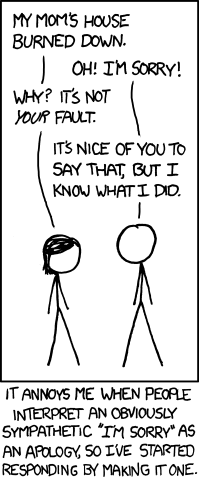I'm Sorry

You know I've always hated her.

You know I've always hated her.
The term "I'm sorry" expresses a general feeling of sorrow or grief. It can be used either as an apology (expressing sorrow for one's own actions) or of sympathy (expressing sorrow for someone else's misfortune). Both uses are normal and acceptable, and the distinction is generally clear from the context. Some people deliberately conflate the two uses, treating an expression of sympathy as if it were an apology. This confusion is almost always feigned, as both uses of the term are well understood.
As it says below the comic, when Megan rejects his sympathetic "I'm sorry" by treating it as if it were an apology and saying it was not his fault, rather than just agreeing with her, an irritated Cueball implies that it was always intended as an apology, because he DID, in fact, burn down her mother's house. It is unlikely that he actually burned her house down, but rather is simply teaching Megan a lesson not to nitpick so much.
The title text has Cueball further attempting to convince Megan that he is not just being sarcastic, but really did set the fire, for the simple reason that he hates her mother.